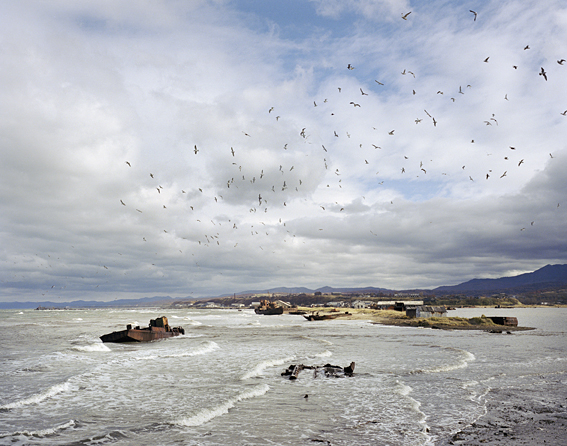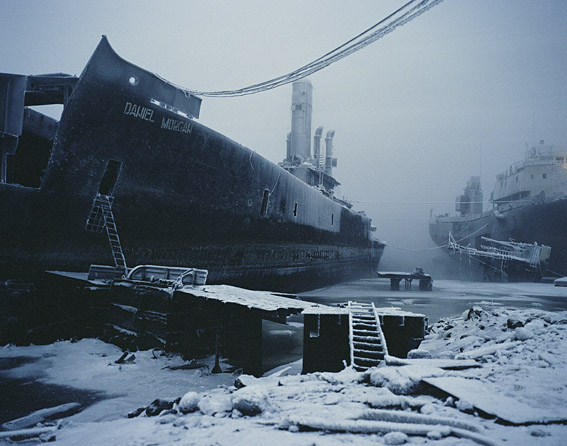I’m off to the Epsom Derby tomorrow, so this seems like a good opportunity to post up the wonderfully satirical painting The Derby Day by William Powell Frith.
Â
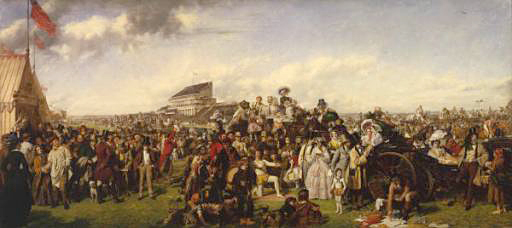
William Powell Frith, The Derby Day (1856-8). Oil on canvas.
Â
The painting presents a panorama of modern Victorian life and when it was first exhibited at the Royal Academy in 1858, it proved so popular that a rail had to be put up to keep back the crowds. There are three main incidents. On the far left a group of men in top hats focus on the ‘thimble-rigger‘ with his table. In the centre is an acrobat and his son, who looks longingly at a sumptuous picnic being laid out by a footman. Behind them are carriages filled with racegoers, including, on the far right, the mistress of a man leaning against the carriage.
It’s a captivating painting, which naturally, needs to be seen in the flesh. It’s on display in Room 13 of Tate Britain along with a selection of paintings under the heading ‘The Art of Leisure’ (devised by curator Christine Riding). I visited the museum for some last minute inspiration before embarking on this trip, and was lucky enough to have Tony Godfrey from Sotheby’s Institute of Art as my guide. This room felt particularly relevant.
Â
The introductory panel to ‘The Art of Leisure’ reads-
“Queen Victoria died in 1901. During her long reign the enjoyment of leisure time had spread beyond the wealthy upper classes to a wider range of people living in British cities. The lives of working people were hard, but they had greater spending power, shorter working hours and more holidays: more opportunities to enjoy themselves.
A great variety of new activities were on offer: music halls, railway excursions, fairgrounds, commercial exhibitions and sporting events; or just listening to the band in one of the new public parks. The growth of the railways enabled city people to head for the country or seaside for picnics, rambles, swimming and boating. By 1911, just over half of the population of England and Wales made at least one seaside trip every year.
Artists were fascinated with the new leisure activities, but some critics argued that everyday life was not a suitable subject for a painting unless it had a clear moral purpose. The earliest works in this display use narrative and satire to comment on contemporary morality and behaviour. But the guidance offered by later painters, such as James Tissot, is much less clear. In the decades after Victoria’s death, new styles of painting emphasised the light and atmosphere of outdoor leisure activities, rather than the lessons to be drawn for them.”Â
Â
Here are some of the other paintings on display-
Â
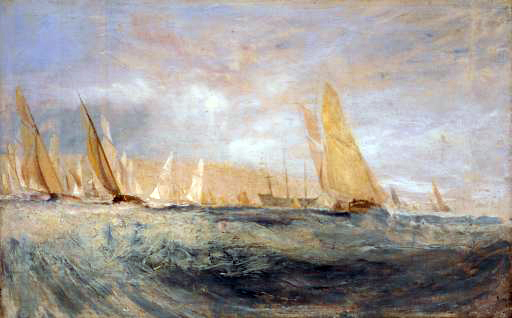
Joseph Mallord William Turner Sketch for `East Cowes Castle, the Regatta Beating to Windward’ No. 3  (1827). Oil on canvas.
Â
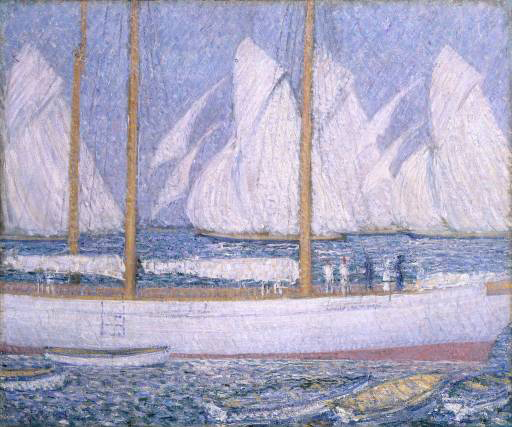
Philip Wilson Steer A Procession of Yachts (1892-3). Oil on canvas.
Â
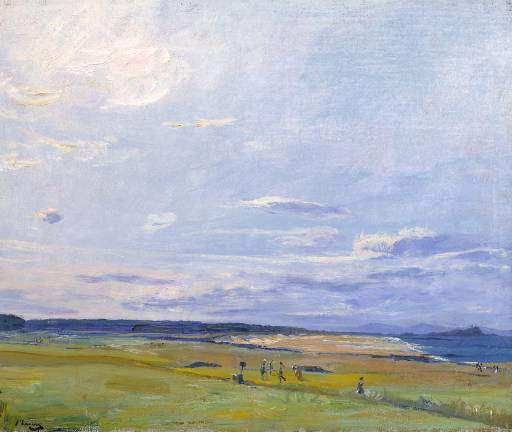
Sir John Lavery The Golf Course, North Berwick (1922). Oil on canvas.
Â
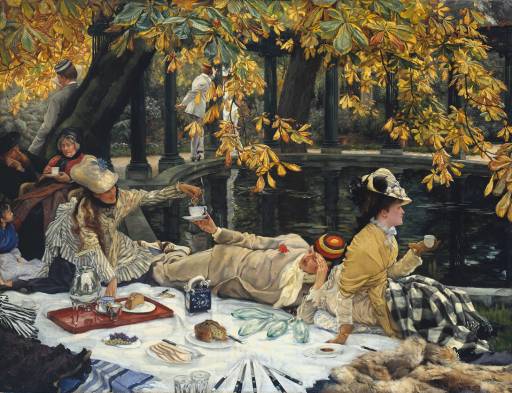
James Tissot Holyday (circa 1876). Oil on canvas.
Â
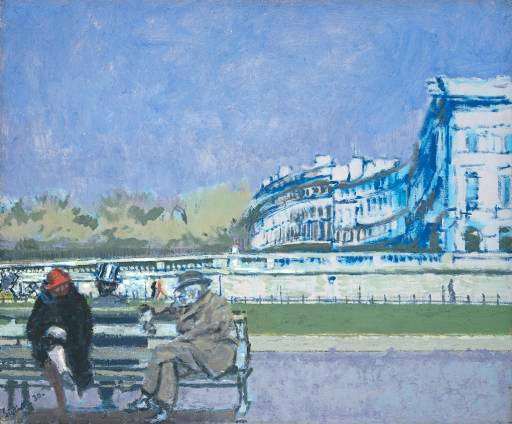
Walter Richard Sickert The Front at Hove (1930). Oil on canvas.
Â
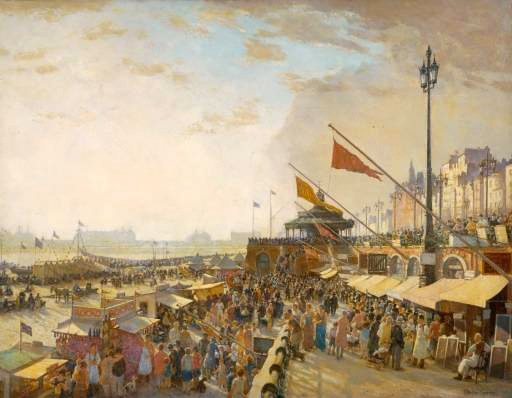
Charles Cundall Bank Holiday, Brighton (1933). Oil on canvas.
Â
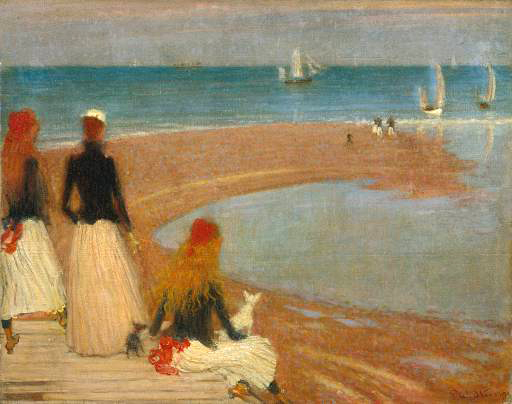
Philip Wilson Steer The Beach at Walberswick (circa 1889). Oil on wood.
Â
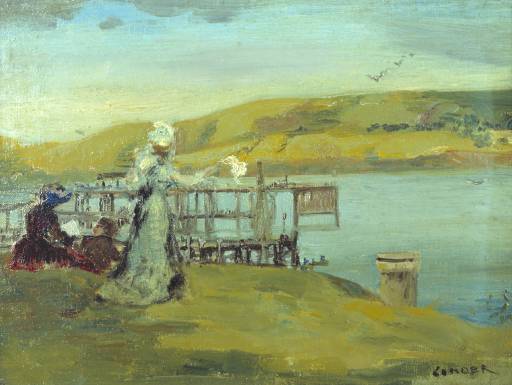
Charles Conder By the Sea: Swanage (circa 1901). Oil on canvas.
Â
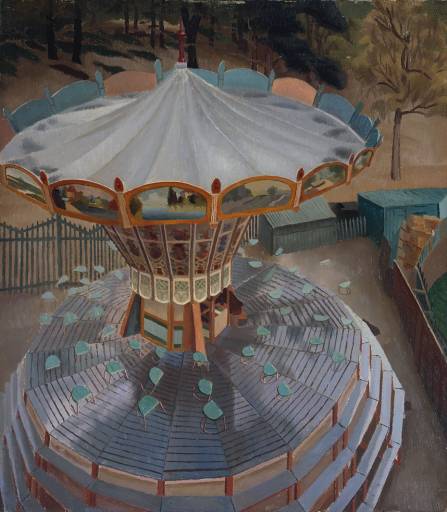
Sir Stanley Spencer The Roundabout (1923). Oil on canvas.
Â
Posted in ART & LEISURE, INSPIRATION, RESEARCH | Comments Off on THE ART OF LEISURE
We were at the Wychwood Festival this weekend, held at Cheltenham Race Course. An intimate event started four years ago, which has quickly established itself as the first major festival of the summer season.
The highlight was The Imagined Village who performed on Sunday night.Â
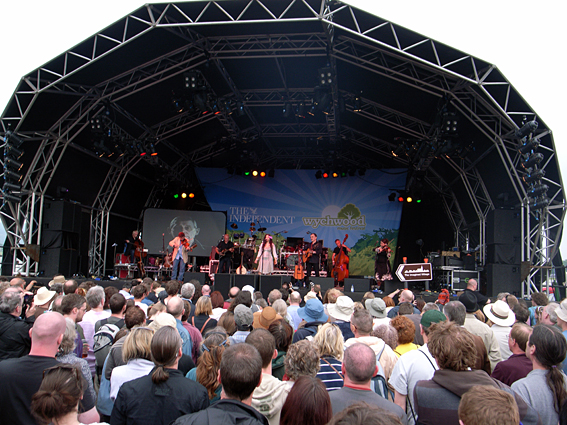
The Imagined Village is an ambitious project bringing together folk musicians including Eliza and Martin Carthy with established pop and rock acts – Paul Weller, Billy Bragg – and a flavour of multicultural England from Transglobal Underground, the British-Asian singer Sheila Chandra and the poet Benjamin Zephaniah.
The project has been masterminded by Simon Emmerson, a DJ and producer best known for his work with the Afro-Celt Sound System and with African acts such as Baaba Maal and Manu Dibango. Emmerson was determined for traditional English music to assume its rightful place on the “world music” scene.Â
The aims of the project, as stated on their website, are:
“We started this project back in 2004 as a way of exploring our musical roots and identity as English musicians and music makers. There is a lot of discussion in the media at present about what constitutes the English identity, we hope to use this web site and our first record as a contribution to this discussion. We are not trying to re-invent the wheel or for that matter re-invent the English folk tradition. What we are interested in is building an inclusive, creative community were we can engage in the debate passed down to us by the late Victorian collectors of English song, dance and stories spearheaded by Cecil Sharpe and his contemporaries.
We all walk in the footsteps of our Victorian song collecting ancestors but feel it is more relevant now than ever to question who decides what it is to be authentic and English and more importantly what it is that makes us proud to be English musicians. We are not providing a manifesto or for that matter any easy answers.”
Read more about the project in an article which featured recently in the New Statesman.
Or find out more about the individual artists-
Benjamin Zephaniah
Billy Bragg
Chris Wood
Eliza Carthy
Johnny Kalsi
Martin Carthy
Paul Weller
Sheila Chandra
Simon Emmerson
The Copper Family
The Gloworms
Tiger Moth
Trans-Global Underground
Tunng
Â
Posted in EVENTS & PASTIMES, INSPIRATION | Comments Off on THE IMAGINED VILLAGE
I’m delighted to say that two images from Motherland have been selected for the 240th Royal Academy Summer Exhibition in London.
‘Abandoned Warship’ and ‘Alexandrovsk Port’ (below), will be on display 9 June — 17 August, in what is arguably the world’s largest contemporary art exhibition of paintings, sculptures, drawings, prints and architectural models.
The theme this year is ‘Man Made’ and will be explored throughout the exhibition and across all categories of entry.Â
Alexandrovsk Port, Sakhalin Island, October 2004
Abandoned Warship, Kola Peninsula, January 2005
There’s an interesting article on the Royal Academy website called ‘Things you never knew about the Summer Exhibition’Â here.
And an article in The Times about the exhibition here.
Â
Posted in MOTHERLAND | 1 Comment »
I’m pleased to say that The Times will be running a weekly dispatch from my journey in T2 every Monday. The image will be a digital photograph (the images for the book are being photographed on a traditional 5×4 plate camera – see this post for details) taken from a different location each week.Â
This week the photograph comes from Weymouth.
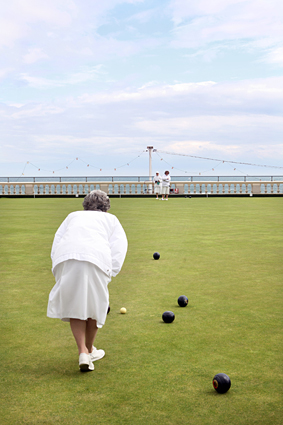
After torrential rain in the morning, the ladies of Greenhill Bowling Club in Weymouth continue with their Bank Holiday County Fours match against Wellworthy. Â Although traditionally regarded as an old-fashioned pastime, bowling is gaining in popularity all the time, partly as a result of our aging population but also as a consequence of a popular revival in all things quintessentially English.
Â
Posted in POSTCARDS | Comments Off on WEEKLY DISPATCH IN THE TIMES
I’m afraid all 150 limited edition prints have now gone, but please keep your ideas coming. Here are some of my favourite ideas that have been posted up so far.
from Lloyd Spencer:
“Tourism is such a vital part of local economies. Most ‘traditional’ festivities are likely to have a big PR component. What interests me are the new ‘traditions’ that have been invented, especially where these really are ‘vernacular’. Here in Headingley, Leeds the traditional pub crawl has long been called the Otley Run as it goes along the Otley Road (A660). What is fairly new is how many groups adopt fancy dress so that on virtually any day one can meet people in the most extraordinary costumes walking past the local supermarket.â€
from Tessa Bunney:
“I’m sure you will have considered fishing already but having spent a few years in my early freelance career photographing for fishing magazines, I was always fascinated by the (usually) men who sit on the edge of a very un-picturesque concrete hole with 3 fishing rods that beep when giant carp can’t help but bite only to throw them back in at the end of the day. Not sure if that’s peculiarly English but most other nations I’ve come across catch to eat!â€
from Jo Foster-Murdoch:
“A flotilla of friends (from the very old to the very young) that only meet up once a year on an annual trip to the Norfolk Broads on the last week of July. Alcohol fuelled cruisers following a bunch of drunken musicians since 1965 who like to call themselves The Water Rats Jazz Band. Last year I think there were about 12 hire craft following the band from their lunchtime gigs at an ale house on the Broads to evening gigs in similar situ. The next day – the whole process starts again.â€
from Mike Bentley:
“Rock-climbing has its own particular style in the UK. A fierce ethic of not using artificial aid, especially on the short, tough gritstone climbs of the Peak District. This blossomed amongst the tough working class men of northern industrial towns like Sheffield escaping from the factories to find something ‘higher’ in their lives.â€
from Dawn Hazle:
“Something really unusual, mostly unheard of by ‘normal’ people and actually quite popular are LARP (Live Action Role Playing) events. LARP is usually a fantasy-genre role-playing event where people get dressed up and, in its most energetic form, people fight in swords-and-sorcery battles with ‘safe’ foam weapons. It’s a bit like reenactment.â€
from Kerri Hawkins:
“Walking my dogs through Box Hill on a bright, sunny summer’s morning, followed by a drink at any one of the pubs on the way back home for lunch. Nothing to beat it.â€
from Sam Gee :
“The very low-key but not to be underestimated pastime of having an allotment. My father has one and derives a great deal of pleasure from growing enormous amounts of fruit and veg – including things you would not associate with the UK, like Pak Choi. I think the practice started during or between the World Wars, when food was scarce so home-grown was essential.â€
from Nigel Smith:
“Otley Chevin (overlooks Otley) is a lovely place and you can watch the planes take off from Leeds Bradford Airport with a pint at the pub over the road.â€
from Casey Floyd:
“Something that for me sums up rural traditions is the sight of my mother and all her friends competing for honour, bragging rights and top prizes of 50p at her village horticultural society shows. The Olympics don’t touch it. Sir Steven Redgrave would be crushed by the intensity of the competitive edge.â€
from Niall Taylor:
“I suggest you go to Frinton-on-Sea in Essex, the home of my late grandparents. They were obsessed with being the right side of the level crossing (sea facing). Indeed you were not considered a proper Frintonian unless you lived ‘inside the gates’. In 2000 Frinton got its 1st pub to much public debate. My brother and I were sent to Frinton when we were little for the summer to attend a church summer school, this abruptly stopped when we were accused of deliberately ripping the wall paper in the lounge and promptly sent home. I have really fond memories of a seaside town that was a little odd. Life for my grand parents revolved around the Golf Club, so this is where I’d love for you to go.â€
from Michael Cockerham:
“I remember when growing up making the journey to see my Dad’s parents in Leeds and lying in the back of a clapped out Mini 850 watching the sky turn to black as we passed through the Peoples’ Republic of South Yorkshire, and its capital, Sheffield. When the last of my Leeds relatives died, the family went to the funeral, but it was the journey back that was informative: how many groups of people make journeys in convoy for whatever reason? Like us, they always choose to stop at a prearranged service station to stretch legs. Those service areas are so impersonal, and yet often they become an unintended last meeting place before groups split to go back to their everyday lives.
Next week, we’re heading through Hampshire and Surrey so if you have any ideas from these regions, let me know. Thanks!
Â
Posted in YOUR IDEAS | Comments Off on YOUR IDEAS
“I’ve wasted the whole of my life playing this game. It’s claimed my knees and it occupies every spare synapse in my brain. I’m not even sure I like it anymore…”
The Nightwatchmen: an amateur London cricket team, making up for in enthusiasm what they lack in ability. As they gather on a sunny Sunday to face Bernard and his ethnically diverse and highly talented squad, Will, Thiz, Clive and their team-mates spend the day smoking, drinking tea and discussing love, politics and the correct interpretation of the LBW law.
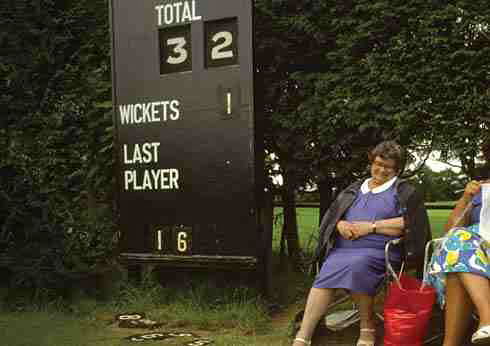
Richard Bean’s witty new play, The English Game, which explores the modern British psyche and sate of the nation through a simple game of cricket, is getting some good reviews and can be seen this coming week at the Oxford Playhouse.
Â
Posted in EVENTS & PASTIMES | Comments Off on THE ENGLISH GAME













